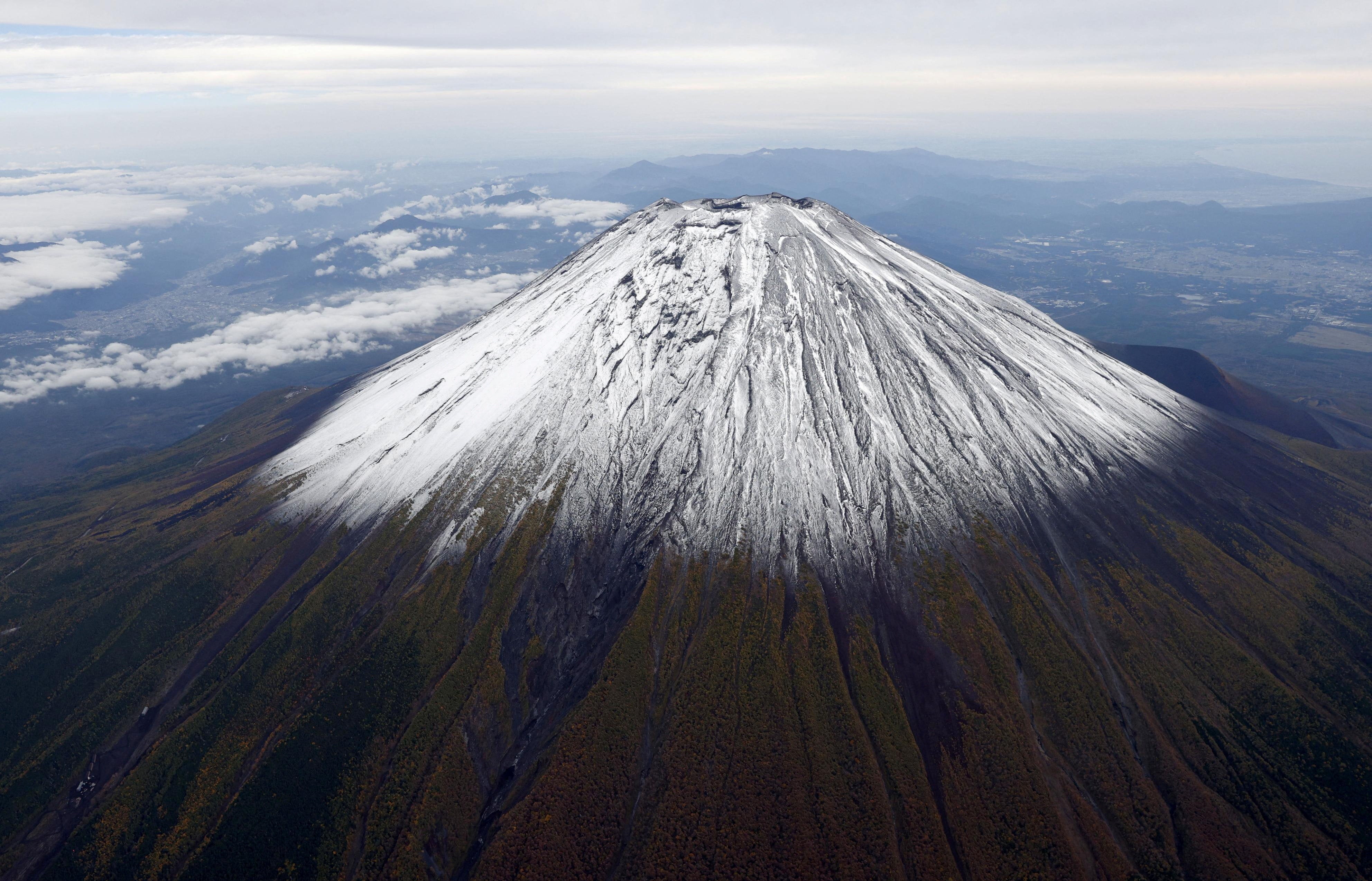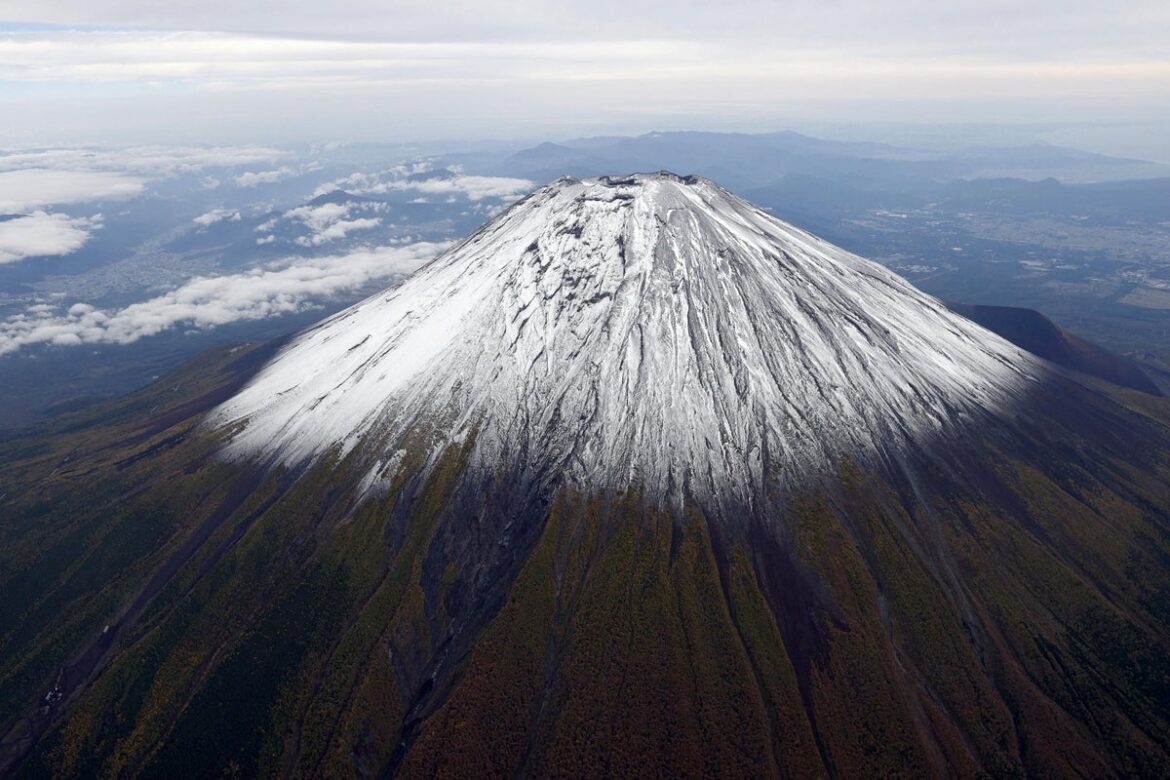Your support helps us to tell the story
From reproductive rights to climate change to Big Tech, The Independent is on the ground when the story is developing. Whether it’s investigating the financials of Elon Musk’s pro-Trump PAC or producing our latest documentary, ‘The A Word’, which shines a light on the American women fighting for reproductive rights, we know how important it is to parse out the facts from the messaging.
At such a critical moment in US history, we need reporters on the ground. Your donation allows us to keep sending journalists to speak to both sides of the story.
The Independent is trusted by Americans across the entire political spectrum. And unlike many other quality news outlets, we choose not to lock Americans out of our reporting and analysis with paywalls. We believe quality journalism should be available to everyone, paid for by those who can afford it.
Your support makes all the difference.Read more
Japan’s iconic Mount Fuji received its first snowfall of the season on Thursday, 21 days later than usual.
According to the Kofu meteorological office, located about 40km from Fuji, a light white dusting was visible from the city after temperatures near the peak dropped below freezing overnight.
The snow came after an unusually hot summer, Asahi Shimbun noted.
Mount Fuji’s first snowcap of the season is announced as soon as it becomes visible from the observation point of the Kofu meteorological office, a tradition going back over a century.
Japan’s tallest mountain typically receives its first snowfall in early October. This year’s initial dusting, however, still comes earlier than last year’s record-late 7 November, the latest date recorded in 130 years of observation.
Meteorological officials noted last year that October rainfall hadn’t brought any snow, and average temperatures at the summit were the highest on record. Experts said that global warming was a contributing factor.
The previous record for delayed first snowfall on the 3,776m mountain was 26 October, set in both 1955 and 2016, with record-keeping dating back to 1894.
The late arrival of snow on Mount Fuji, experts believe, reflects broader shifts in seasonal weather patterns driven by the climate crisis. Extended summer heat is altering rainfall and snowfall patterns globally, making 2024 the hottest year on record for the second consecutive year.
Japan’s coastal and mountainous regions are experiencing a similar impact, with warmer autumns and milder winters becoming more common.
Japan experienced extreme heat this summer. The nationwide average temperature was 2.36C above normal and Isesaki in Gunma prefecture reached a record 41.8C in early August.
The Japanese Meteorological Agency reported at least 30 instances of temperatures exceeding 40C, nearly double the previous record of 17 in 2018. As a result, 100,000 people were hospitalised for heatstroke.

open image in gallery
A photo taken from a helicopter shows the season’s first snowcap on Mount Fuji on 23 October 2025 (Kyodo)
High temperatures persisted even when autumn arrived, with more than 30 locations across the country hitting October highs and Kagoshima recording 35C.
Research shows that Japanese summers lengthened by around three weeks between 1982 and 2023.
Rising land and sea temperatures along with warmer westerly winds and the Kuroshio current – a warm ocean current flowing from the tropical Pacific along Japan’s eastern coast – are causing this change, experts say. Winter in Japan stays about the same, but spring and autumn are getting shorter.
Experts warn that if global warming continues unchecked, the country may effectively have only two seasons within the next 30 years.
“This year we have seen very high surface temperatures in both the Pacific Ocean and the Sea of Japan, so on both sides of the islands of Japan, which has contributed to the higher-than-average humidity and warmer air temperatures over the land,” Yoshihiro Iijima, professor of climatology at the Tokyo Metropolitan University, told the German broadcaster DW.
“We’ve broken records for three years in a row and this is an extremely worrying trend. I would have been worried about a gradual increase in temperatures, but we are seeing abnormally high rises,” he added.
A study published last month said that “the record high temperatures observed around Japan in summer 2025 would virtually never have happened with the assumption of no effects from global warming”. “The rate of temperature increase experienced under global warming has accelerated in recent years,” it said. “Record-high summer mean surface air temperatures over Japan have been observed in three consecutive years, 2023 to 2025, far exceeding the projected linear trend of temperatures based in the period from 1995 to 2024.”
Hikers from around the world climb Japan’s tallest mountain from July to September, with some 200,000 attempting the summit annually. Many make an overnight trek to witness the sunrise from the peak.
Mount Fuji is also a sacred site for Shinto and Buddhist pilgrims, featuring a shrine at the summit dedicated to Konohanasakuya-hime, the mountain’s Shinto goddess.


AloJapan.com